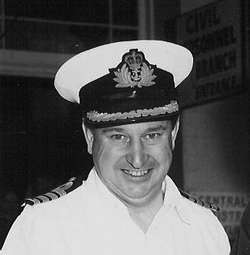- Author
- Wright, W Graham, Captain, RAN (Retired)
- Subjects
- Biographies and personal histories, Obituaries
- Tags
- None noted.
- RAN Ships
- HMAS Creswell, HMAS Cerberus (Shore Establishment)
- Publication
- March 2010 edition of the Naval Historical Review (all rights reserved)
William Shakespeare wrote: ‘The good men do is oft interred with their bones’.
So that this will not happen here, I will tell you about John Bell, the boy, which will show how his strong will to succeed in all that he did in life manifested itself to me.
I cannot do this successfully without including references to those with whom we joined the Royal Australian Navy. Over four years, we bonded as a band of brothers, often in adversity and sometimes in a togetherness above and beyond that of family.
In 1933, five hundred 13-year old Australian boys of the Great Depression applied to enter the Royal Australian Naval College HMAS Cerberus, then located at Flinders Naval Depot, at Crib Point in Westernport, Victoria. When I talk of the RAN, you must appreciate that I am referring to the then, and not the now. There were three guiding principles which governed decision making then:
- First, it had to be cheaper;
- Second, it had to be less expensive; and
- Third, it had to not cost so much.
After the competitive examination, medical test, and gruelling interview, 12 boys were successful – four each from New South Wales and Victoria, two from South Australia, and one each from Queensland and Tasmania. Because two members of the previous intake failed their examinations at the end of First Year, our numbers were increased to 14 by the addition of two from Western Australia. They had not been included in the original selection because of the high cost of interstate travel to and from their homes for the leave breaks in May, September and December.
Moving the College from Jervis Bay to Flinders Naval Depot as an economy measure had some advantages. The total active strength of the RAN at the time was 3,249. Of these, when the college was at full strength, the 48 future officers would see and be seen by many of those officers and men with whom they were being trained to serve. However, because of the reality that we were to be trained to be interchangeable with equivalent Royal Navy officers, our ‘Australianess’ had to be modified, both in brawn and brain. An RN officer with Dartmouth experience was always one of the term officers at the College.
And so, as Cook Year 1934, John and I joined 12 of our fellows. We were fortunate in having as our Term Officer a formidable identity, Lieutenant Arnold Green, of whom many RN officers were to comment that if he had been an RN officer he would surely have become an Admiral. The Captain of the College was an RN Rear Admiral, whom we hardly ever saw. Commander Showers, the Commander of the College, ranked just below God, and Hec Waller, who took over at the beginning of second term, was almost on an equal footing with the Almighty.
Homilies abounded, for example:
- Gentlemen do not, others must not;
- It is better to be 10 minutes early than 10 seconds late;
- Don’t do as I do, do as I say; and
- He who wishes to command must first learn to obey.
The alphabet governed our lives. We lived four to a room with double bunks. Anderson and Bell shared with the two Cadet Captains in the first cabin, Bradshaw, Brown, Cartwright and Cooper followed, then Howard, Hunter, Johns and Millar came next and, finally, there was Savage, Sutton, Wright and Yonge in the fourth cabin next to the communal bathroom.

In classrooms, we sat in alphabetical order from the front. Competition abounded in all that we did and was to continue throughout our time in the Navy. Seniority was not only an important issue – it was everything.
The first term was unbelievably tough, so much so that Allen Bradshaw, before it ended, decided that he had had enough. One Saturday night, he took off on a long walk home to Fremantle. Before the end of our College time on 10 December 1937, we had lost three more of our number.
